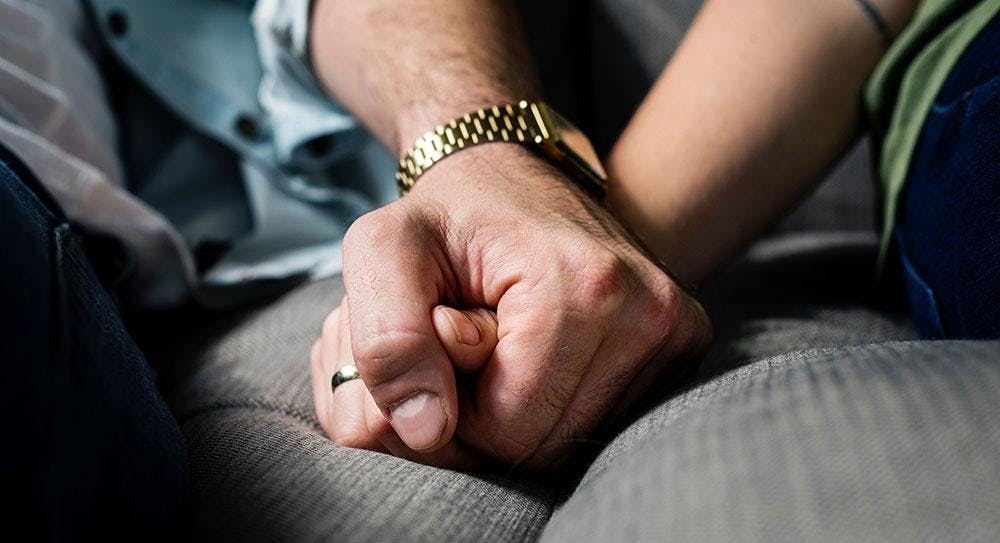Lifestyle
Should We Be More Empathetic?
15min read
Empathy makes us human, but is it always a good thing? We look at the pros and cons of empathy and how to be more (or less) empathetic.
What is empathy?
The word empathy wasn’t used until the early 20th century; even today there are some disagreements around its true meaning and the difference between closely related words like sympathy and compassion.
Our favourite definition of empathy dates back to 1986, when psychologist Lauren Wispe described it as: the “attempt by one self-aware self to comprehend, nonjudgmentally, the positive and negative experiences of another self."
Why are humans empathetic?
Biologically, our ability to empathise comes from mirror neurons in our brains. The same neurons that are responsible for the mirroring behaviour between babies and adults. In fact, in evolutionary terms, it is thought that the maternal bond is where empathy actually originated. Our very existence means that we are descended from a line in which infants were successfully kept alive by responding appropriately to their needs. We are hardwired for empathy.
Aren’t empathy, sympathy and compassion all pretty much the same?
Well, no...
Empathy differs greatly from sympathy and compassion because empathy is imaginative. Without having experienced someone else’s challenges, we use our imagination to put ourselves in their shoes.
Sympathy is a more passive process. Usually, with sympathy, we do know exactly what someone is feeling, and are therefore able to connect with a situation without much effort. Sympathy is also associated with pity, or sorrow, whereas empathy can relate to pretty much any human emotion.
Compassion is different still, while defined as ‘sympathetic pity’ it is rooted in action: when our feelings of sympathy or empathy move us to actually do something about it.

The pros and cons of empathy
While generally thought of as a “good” thing, being empathetic can mean our own feelings mirror another person’s; this isn’t always pleasant. Interestingly, Sara Konrath at Indiana University, who has been surveying young people on empathy since the 70’s, has noted a sharp decline in empathetic tendencies since the year 2000. The 2009 results showed a decrease in empathy of 40%. This alludes to an increased ‘us vs them’ mentality but, according to the research, is not a lost cause: there are things that can be done to build an empathetic population. So how do we do that, and why is it important?
Pros of empathy
Empathy promotes prosocial behaviour
On the most straightforward level, a society in which empathy is practised and encouraged is a nicer place to live. It also makes us more compassionate, or more likely to actually do something nice for others. Think of “the Golden Rule”, which states that we should treat others as we wish to be treated. This isn’t possible without empathy. It makes us better friends, parents and partners, but it is changeable and inconsistent. We are far more likely to extend empathy to those that are “like us.” The basis for this is biological: animals have the ability to switch empathy off when under attack from outsiders or when hunting prey.
Evolutionarily, though, humans are socially different from even our closest relatives in a number of ways. While chimpanzees attack other chimps that are not a part of their community, humans are able to coexist — in general — quite happily with millions of strangers in incredibly close proximity. And, going a step further than simply the ability to live in multicultural settings, empathy is the single most important quality humans have to overcome xenophobia, the antithesis of social behaviour.
Empathy encourages innovation
An ability to be empathetic is also linked with increased innovation in the workplace. Humans often have needs but struggle to articulate them, i.e. people know they want something but don’t really know what that something is. This can lead to seemingly mad inventions like the Post-It note as well as far more obvious ones like X-Ray machines.
According to the Book of Life, in order to get into a customer’s mindset, businesses need to allow time for introspection and promote empathy. They need to really walk in their customer’s shoes, and this isn’t often an easy feat when their customers aren’t “like” them. Yet, engaging empathy to make your product genuinely work for your customer base can make all the difference — like children’s toothbrushes — or not — like park paths set at right angles that don’t take efficiency into account.
Empathy is a voyage of the imagination
Importantly, empathy isn’t just about others. It starts with us. If we extend empathy to ourselves we become more self aware and, as a result, our capacity to cultivate and extend those qualities to others is far more likely.
Empathy is often at its most beautiful when we think of its effects on the individual: it can simply be a voyage of the imagination. If we give ourselves permission to approach differences with curiosity rather than automatic judgement, our inner lives become richer. So while empathy has the capacity to be altruistic, it can also provide benefits to ourselves and this is absolutely a reason to practise it.

The con(s) of empathy
Taking sides
All the positive aspects considered, empathy does have its downside. In modern life, when we are so connected to everything all at once and, when we are constantly confronted with another tragedy somewhere in the world, empathy can be overwhelming. Being too empathetic can be detrimental to our own self.
This can lead us to take sides, and once a side is chosen our desire and ability to empathise with the opposing side often decreases significantly. We are confronted with these decisions — sports team rivalries, media-fuelled court cases, politics — on a daily basis and they polarise us. To protect ourselves and prevent emotional burnout, we cultivate detachment consciously or subconsciously. We draw arbitrary lines in the sand between what we care about and what we don’t because, simply put, caring about everything is just too much and, with all the demands that life throws at us, we just don’t have the time or the energy.
Vulnerability
Empathy is intrinsically linked to vulnerability. Truly opening ourselves up to feel what someone else feels is a scary prospect and — once we allow ourselves to go there — one we have little control over. The interesting thing here is that while we may perceive vulnerability as a negative thing, there actually is increasing evidence to say that this isn’t necessarily the case.
In fact, 12 years of research into human connection led researcher-storyteller, Brene Brown, to one thing. You guessed it: vulnerability. In a nutshell, the courage to be vulnerable — to be “really seen” — allows us to feel worthy of love and connection. This vulnerability comes from a sense of compassion for ourselves — allowing ourselves to be, and be seen as being, imperfect. It then drives our ability to empathise and, in turn, allows others a chance to empathise with us.
So while we’ve classed vulnerability as a “con”, we’re not convinced that’s where it actually belongs. We’ll let you make up your own mind on that one...

How to practise being more (or less) empathetic
Overall, empathy — both for ourselves and others — is a positive thing, even with all the vulnerabilities it can create. The importance of making a conscious decision to do things that cultivate empathy shouldn’t be underestimated: tiny shifts in our mindset can make huge differences. Generally, time and energy aside, the one thing that holds us back from exploring empathy is fear and this is a very real thing: being open to empathy means a very real possibility of self-change.
Our individual ability to empathise does have some limitations, though. It’s a balance of nature and nurture: genetics and socialisation. Not everyone can be empathetic all the time, and not everyone can be as empathetic as the next person. This is not a reason not to try: empathy is like a muscle: the more you use it, the stronger it gets.
Some simple ways to cultivate empathy
- Approach situations with curiosity. As far as you’re able, be aware of your propensity to judge and, if you can, spend time exploring where those judgements might arise from.
- Work to listen actively to others, especially when debating. So often, we listen to counter someone else’s viewpoint rather than to actually understand. While our view might not change, truly listening to someone when they explain how they feel and why they feel that way can foster connection in unexpected places.
- Make a conscious effort to respond thoughtfully to others. Often, looking on the bright side by saying, “At least…” doesn’t help; in situations where another person is suffering and looking for support, sometimes admitting you don’t know how they feel — but that you’re there for them anyway — is actually the best thing you can do.
- The above require a certain open-mindedness and open-heartedness but finding commonalities — areas of interest, shared passions — even in opposing viewpoints cuts down the “us vs them” mentality and opens up the possibility to empathise.
- Read novels: novels are the ultimate exercise in empathy. In order to create a character, an author must delve fully into their experience and reading novels about people who are different from ourselves can provide a safe space to practise empathy.
- Or, if you’re more invested, try some thought exercises. The easiest is to try and imagine yourself into a different gender: what might it really be like to be a gender other than your own?
But if you’re in need of more empathy for yourself...
The Book of Life is on hand to help here, too. Their advice: “If you struggle with feeling overwhelmed by empathy for everything around you, the best thing to do is turn that empathy inwards and cultivate empathy for yourself first and foremost.”
There are a number of ways to do this:
- Limit exposure to negativity. In the age of social media, it’s more important than ever to put some of our own boundaries in place and be discerning about how much time and attention we pay to negative news. We can choose to unfollow accounts that bombard us with distressing posts or simply turn notifications off so we can at least choose if (or when) we access them. We can also make an effort to subscribe to more positive news outlets to give us a semblance of balance: Positive News is one great example.
- Loving- Kindness Meditation. While meditation in general is a great tool to help us navigate life, practicing a specific kind — loving-kindness meditation — is a great way to start a conscious journey into empathy. It involves deliberately imagining people, starting with yourself, experiencing happiness and freedom. It all sounds a bit hippy dippy, but the reality is that it has a threefold effect. By dedicating a few moments of your day to be kind to yourself, it helps you: build emotional resilience; make and maintain meaningful social connections; and respond to challenges with compassion.
- Practise gratitude. There is so much science nowadays that supports the ancient practise of gratitude. It has a whole host of benefits, but one of the biggest — in terms of our ability to be empathetic and therefore compassionate — is that it helps us to shift our focus from the negatives to the positives in a very real way. Keeping a gratitude journal regularly means that we begin to notice things that make us feel good and, by acknowledging these, they become more rooted in our brains. Our neural pathways can even change. A simple notebook is all you need, but there are also apps, like Happyfeed, that will send you a beautiful reminder at a time of your choosing.
In conclusion
The most recent research shows that a situation of conflict — anything from an election to a differing lifestyle choice — is the biggest trigger for feeling empathy; we pick a side that resonates with us and are drawn into that mindset. From that point on, though, our empathy is limited to that viewpoint and we enter an “us vs them” mindset. This leads to increasing social polarisation due to these perceived differences. Therefore, where empathy is at its most powerful — but most challenging — is in empathising with the “other”. And there are a lot of “others” out there.
So, we think that cultivating empathy, beginning with ourselves and working outwards, is a super important process and that being compassionate is a great quality. After all, we care about a lot of things for lots of reasons. Fundamentally, we believe that empathy leads to healthier choices for ourselves as well as for the planet and everything on it. Recent YouGov research shows that the most common reason for people choosing to eat more plants is a concern for animal welfare so we’re not so convinced that empathy is dead.
In fact, empathy is the antidote to apathy. While the modern world can feel overwhelming, our mobilising force is empathy and empathy is like a muscle: the more we use it, the stronger our empathetic abilities get, and the more compassionate we become.
By Munjeeta Sohal
MJ is a freelance writer, avid reader and habitual ruminator (and user of fancy words). She couldn’t live without books and her cats. On her days off, you can find her cycling up and down the Lea Valley, searching for a great vegan recipe to cook, or, well, reading her book with her cats.
Let us take care of dinner
We help to make eating more plants easy and delicious. Fancy letting us take care of dinner? Check out our delicious meals here.
Shop now
